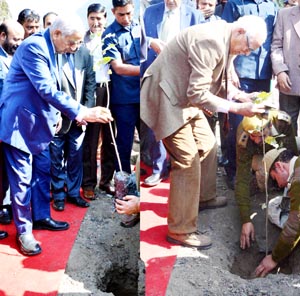
Excelsior Correspondent
FRISLAN (PAHALGAM), Oct 18: In a rare public-private partnership aimed at eco-restoration of critically-degraded forests, Chief Minister, Mufti Mohammad Sayeed joined hands with Governor N N Vohra, to launch the Pilot Afforestation Programme from Frislan, here today.
Addressing an impressive gathering of people who had converged onto the small hamlet here, the Mufti said his concern to revamp the State Forest Policy was to make people living in close proximity of forests equal partners in eco-restoration drives of the Government, as they are the vital stakeholders. “We must inculcate a sense of ownership amongst the villagers as forests provide sustenance to the people living close by,” he added
He urged the Forest Minister to conceptualize a plan for creation of an enabling environment, whereby the people living in contiguity of forests are made an integral part of any conservation initiative. “The Forest Department must conceive a plan, with active involvement of Tourism Development Authorities and Shri Amarnath Shrine Board for Sonamarg-Baltal-Pahalgam stretch to begin with,” he said, adding more steps should be taken for wayside plantations on the picturesque Daksum-Warwan and Aharbal-Kongwattan stretches.
Referring to the annual holy Amarnath pilgrimage, Sayeed said even the yatris should be encouraged to plant saplings en route the to Cave extend the forest cover and make the journey a more enjoyable experience. He said the Government has launched this afforestation scheme on a pilot basis in both Kashmir and Jammu divisions.
In order to tap the full tourism potential of the vast natural forests largely untouched by human interference, the Chief Minister emphasized upon developing such areas under eco-tourism by providing camping facility, trekking, bird-watching and other nature-related activities.
As per new policy, all such participating people will be partners in planning, management of closures and decision-making for sharing of the benefits. The Forest Department will play a facilitator’s role so that maximum benefit flows to the people living in the proximity of forests, thereby improving their livelihood on a sustained basis.
Endorsing the Chief Minister’s initiative to restore the degraded forests, the Governor favoured putting a regulatory mechanism in place that involves mountain community in the conservation and plantation drives. “The mountain people are an intrinsic part of the forests. They should get their fair share of the forest wealth,” he stated.
Vohra said the Shri Amarnath Shrine Board will take the responsibility of planting around 10 lakh saplings and fruit plants around Baltal, which will bind the soil together in an area where sliding causes widespread damage in rainy season. He also favoured plantation of juniper shrubs in an areas which is susceptible to soil erosion.
The Governor also advocated plantation of fruit trees like sweet chestnuts, shrubs and other medicinal plants that could yield a good income to the forest people.
The Forest Minister, in his address, laid stress on the urgent need to preserve forests with the active cooperation of the people. He said over the last few years, the green wealth of the State was ravaged, but in the seven months of the present Government, around 10,000 kanals of land has been retrieved by the department. “I would like to thank the Chief Minister for his novel concept of implementing afforestation drives in collaboration with the people,” he added.
Later, the Chief Minister, Governor, Forest Minister, MP, Legislators and the Chief Secretary planted saplings to formally launch the afforestation drive.
As many as 20,230 sq. km. area is under the forests in the State, which is about 46 per cent of the land area excluding Ladakh, which is a cold desert. The Forest Department is making concerted efforts to plant trees on degraded forest areas under various schemes, in particular CAMPA, to cover about 15,000 hectares of land annually by planting more than 80 lakh saplings every year.
The department has about 150 nurseries in the state having more than one crore saplings of which about more than 60 per cent area is of conifer species such as Deodar, Kail and Fir.

